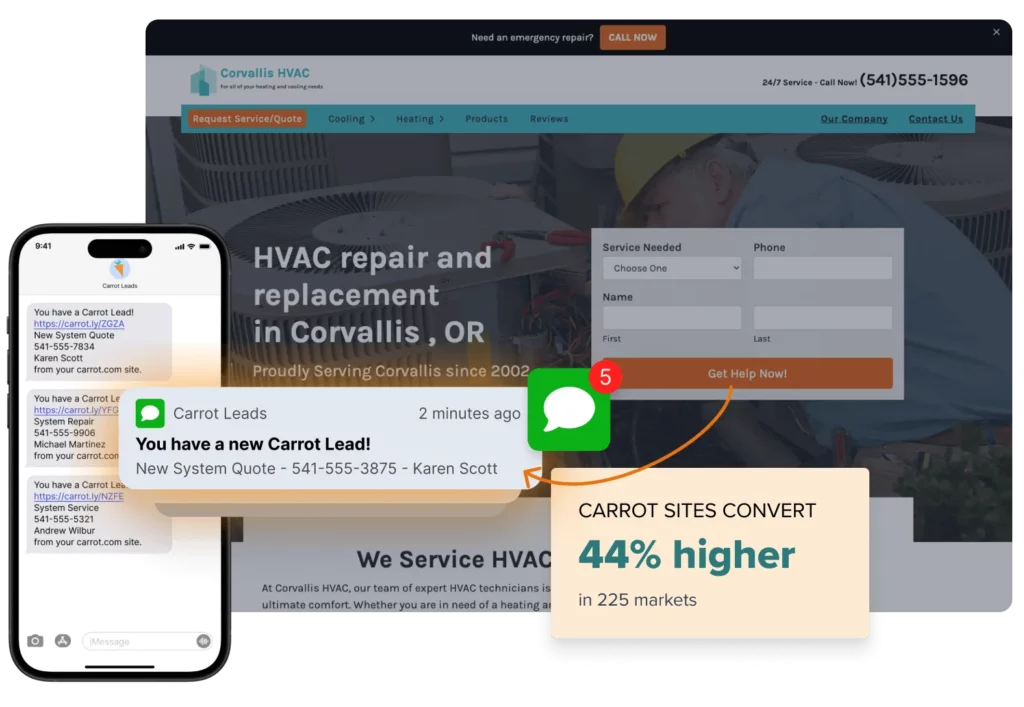
Imagine a potential customer searching online for “air conditioning repair near me.” If your HVAC business doesn’t have a website, you’re missing out on a crucial opportunity to connect with them. In today’s digital age, a strong online presence is essential for any HVAC business that wants to thrive.
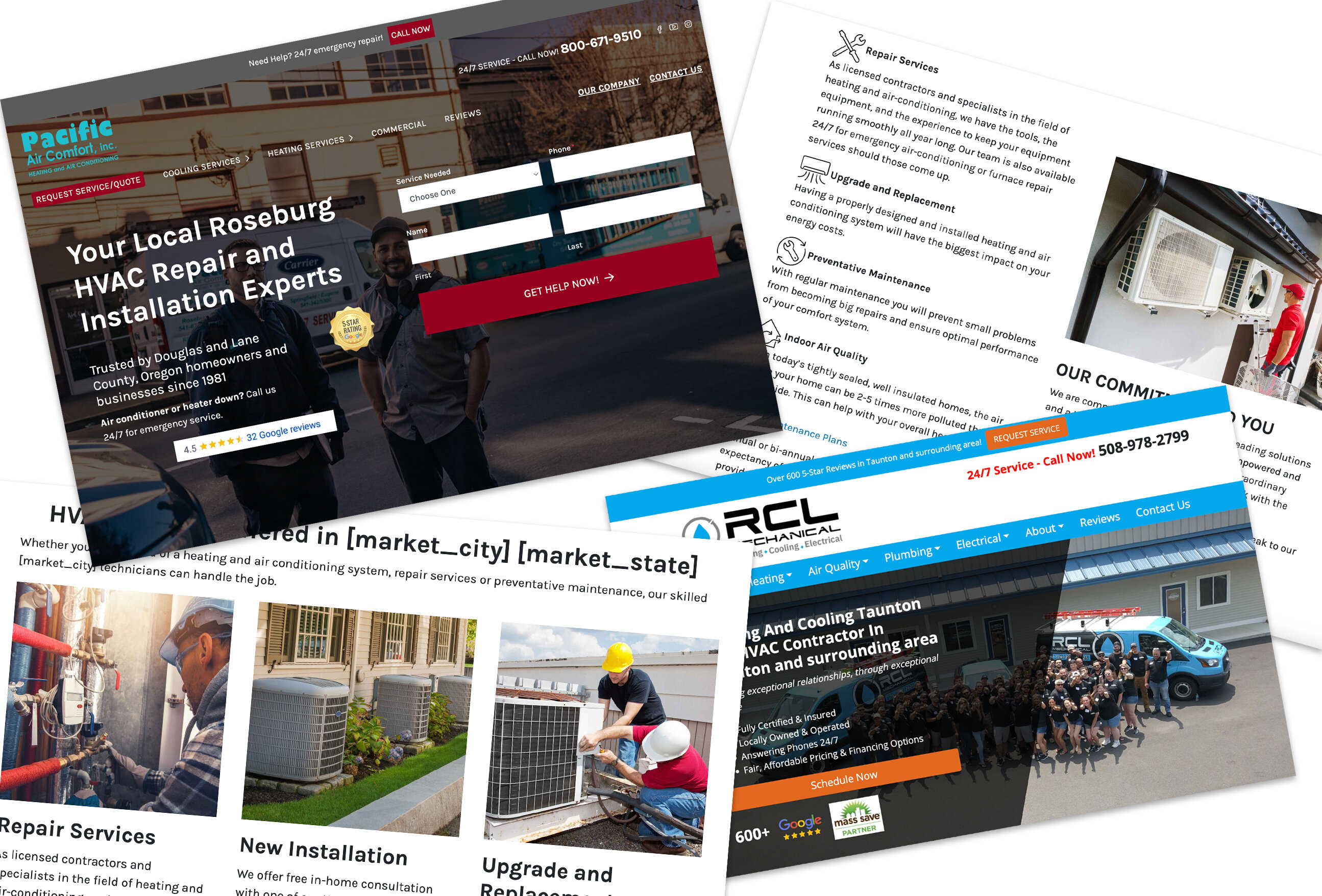
HVAC Websites: Get your HVAC website turning into more leads and clients…
Take a Free DemoWhy is a website so important? Here are just a few reasons:
- Increased Visibility: A website acts as your digital storefront, open 24/7 for potential customers to learn about your services, location, and contact information. The more visible you are online, the more likely you are to attract new clients.
- Lead Generation: Your website can be a powerful lead generation tool. By including clear calls to action (e.g., “Schedule an Appointment Today”) and online forms, you can make it easy for potential customers to contact you for service.
- Improved Brand Reputation: A professional and informative website shows potential customers that you’re a legitimate and trustworthy business. Positive online reviews and testimonials on your website can further strengthen your brand reputation.
Building a website doesn’t have to be overwhelming. There are two main options to consider:
- DIY HVAC Website Builders: These platforms offer user-friendly tools to create your own website, often at a lower cost.
- Professional Website Design: Hiring a professional web design company gives you a custom-built website that perfectly reflects your brand and optimizes your online presence for maximum impact.
This blog post will explore both options in more detail to help you decide how to build an HVAC website.
Laying the Foundation: Planning Your HVAC Website
Before diving into building your website, taking some time to plan will ensure it effectively meets your business needs. Let’s explore some key considerations:
1. Define Your Goals:
- What do you want your website to achieve?
- Do you want to generate leads and convert website visitors into paying customers?
- Is your primary goal to showcase your services and establish expertise in your area?
- Perhaps you want to provide online appointment scheduling or offer customer support resources.
- Having clear goals will guide the content and features you incorporate into your website.
- Who is your ideal customer?
- Understanding your target audience allows you to tailor your website’s messaging and design to resonate with them.
- Are you targeting homeowners, businesses, or both?
- What are their pain points, and how can your services address them?
2. Content Planning:
- What information should your website include?
- Your website should be a comprehensive resource for potential customers.
- Essential content includes:
- Clear descriptions of your HVAC services: Explain what services you offer, including details like heating and cooling system installations, repairs, maintenance plans, etc.
- Up-to-date contact information: Make it easy for potential customers to reach you by phone, email, or contact form.
- Your company story: Showcase your expertise and build trust by sharing your company’s history, mission statement, and team member profiles.
- Customer testimonials: Positive reviews and testimonials are powerful tools for convincing potential customers that your business is reliable and trustworthy.
- Consider adding additional sections such as frequently asked questions (FAQs), a blog with helpful HVAC tips, or a gallery showcasing your previous work.
- Search Engine Optimization (SEO): Consider the search terms potential customers might use to find HVAC services in your area. Optimizing your website content with relevant keywords can improve your search engine ranking and increase organic website traffic.
3. Design Considerations:
- User-Friendly and Mobile-Responsive: In today’s mobile-first world, your website needs to be accessible and easy to navigate on any device (desktop, smartphone, tablet). A user-friendly interface with clear menus and intuitive navigation will keep visitors engaged.
- Visually Appealing and Brand Reflective: First impressions matter! Your website’s design should be visually appealing and reflect your brand identity. Use high-quality images, consistent colors and fonts, and a layout that is easy on the eyes.
By planning your website’s content and design with these considerations in mind, you’ll be well on your way to creating a valuable online presence that attracts new customers and helps your HVAC business thrive.
Improve Your HVAC Website Results
3.3 million leads and counting: now for HVAC companies! Our track record speaks for itself. Get ahead with exclusive early access!

Building Your HVAC Website: DIY vs. Professional Design
Now that you’ve laid the groundwork with your website plan, it’s time to choose the right platform to build it on. Here, we’ll explore two main options:
Option 1: DIY Website Builders
Do-it-yourself (DIY) HVAC website builders are user-friendly platforms that allow you to create your website without extensive coding knowledge. Popular options include Carrot, Squarespace, and Weebly.
Pros:
- Affordability: DIY website builders offer a cost-effective way to build a website, with plans starting at a low monthly fee. This can be a good option for businesses with a tight budget.
- Ease of Use: These platforms are designed with beginners in mind. They offer drag-and-drop tools and pre-built HVAC website templates for creating a website yourself. You don’t need coding experience to get started.
- Flexibility: Many DIY builders offer a variety of features and templates, allowing you to customize your website to some extent.
Cons:
- Limited Customization: While offering some flexibility, DIY builders often have limitations compared to a custom-designed website. You might be restricted by pre-built templates and may not be able to achieve the exact look and feel you desire.
- SEO Optimization: DIY platforms may not offer advanced SEO features to optimize your website for search engines. This can make it harder for potential customers to find your business online.
- Limited Support: While some support is offered, DIY builders may not provide the same level of ongoing technical support as a professional web design company.
Option 2: Professional Website Design
Hiring a professional web design company offers a more comprehensive solution for building your HVAC website.
Pros:
- Custom Design: A professional web designer can create a website that is unique, visually appealing, and perfectly reflects your brand identity. This gives you complete control over the look and feel of your website.
- SEO Optimization: A professional web design company can optimize your website for search engines, increasing your chances of ranking higher in search results and attracting more organic traffic.
- Ongoing Maintenance: Many web design companies offer ongoing maintenance plans to ensure your website stays up-to-date, secure, and functioning smoothly. This allows you to focus on running your business.
Cons:
- Cost: Professional web design services typically cost more than DIY website builders. However, the return on investment can be significant in terms of increased leads and brand recognition.
- Time Commitment: While the web design company will handle the technical aspects, you may need to invest some time in providing initial input and feedback on the design process.
Choosing a Reputable Web Design Company:
- Portfolio Review: Look for a company with a strong portfolio of websites relevant to the HVAC industry.
- Client Testimonials: Read reviews and testimonials from past clients to get a sense of their experience with the company.
- Services Offered: Ensure the company offers services that align with your needs, such as custom design, SEO optimization, and mobile responsiveness.
- Communication Style: Choose a company that communicates openly and effectively, ensuring you’re comfortable asking questions and providing feedback throughout the design process.
The decision between DIY website builders and professional web design depends on your budget, technical expertise, and desired level of customization. Weighing the pros and cons of each option will help you choose the right approach for your HVAC business.
Building Trust and Conversions: Essential Pages for Your HVAC Website
Your HVAC website serves as your digital storefront, open 24/7 to convert visitors into paying customers. You can build trust and encourage potential customers to choose your business by including essential pages with clear, informative content. Here’s a breakdown of the key pages your HVAC website should include:
1. Homepage:
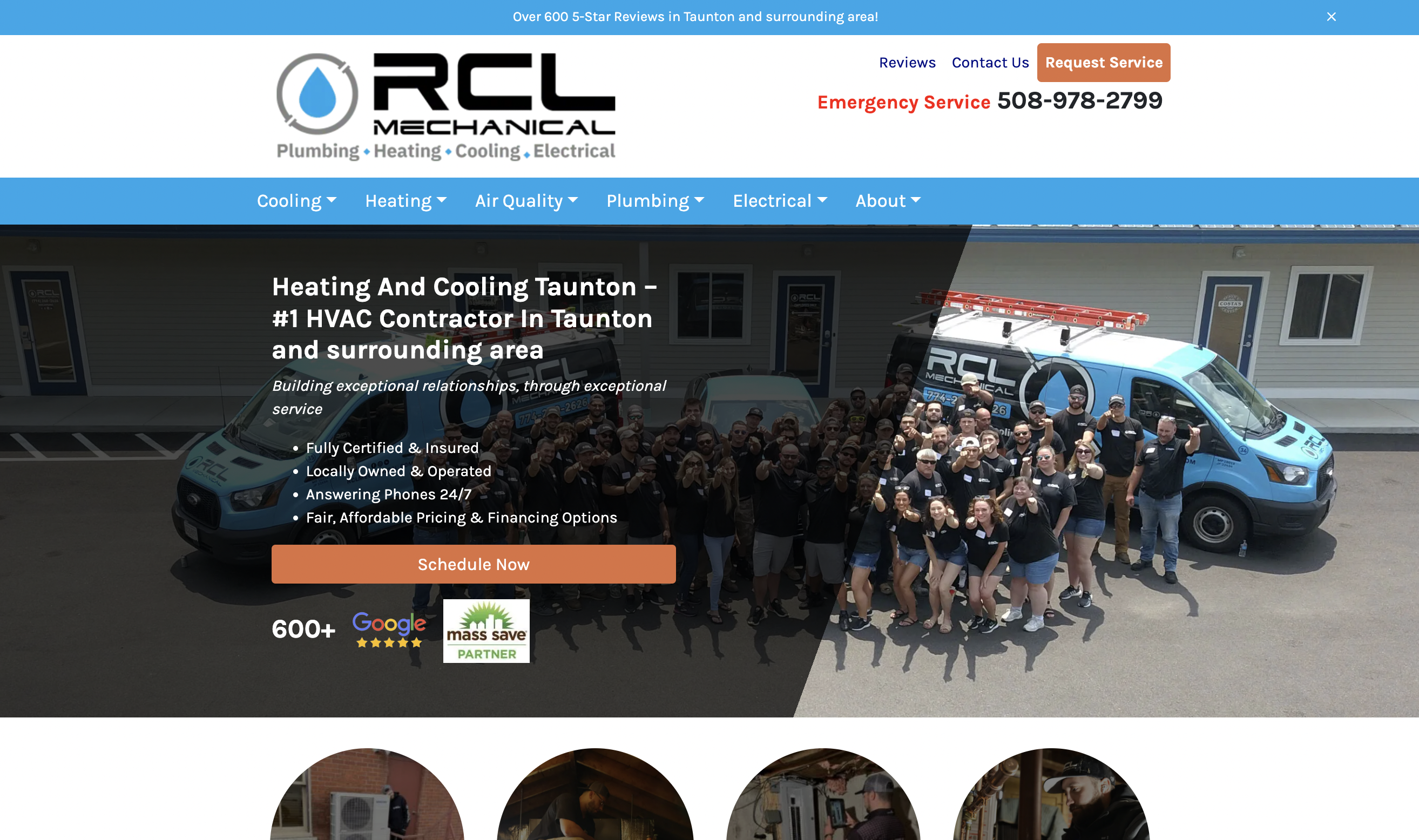
This is your website’s first impression, so make it count! Here’s what to focus on:
- Showcase Your Services: Use clear and concise language to highlight your HVAC services. Consider including visuals like icons or images to enhance understanding.
- Highlight Your USP (Unique Selling Proposition): What sets you apart from the competition? Do you specialize in energy-efficient systems? Offer 24/7 emergency repairs? Emphasize your unique strengths to grab attention.
- Clear Call to Action: Tell visitors what you want them to do next. Whether it’s “Schedule an Appointment Today” or “Get a Free Quote,” make it easy for potential customers to take the next step.
2. Services Page:
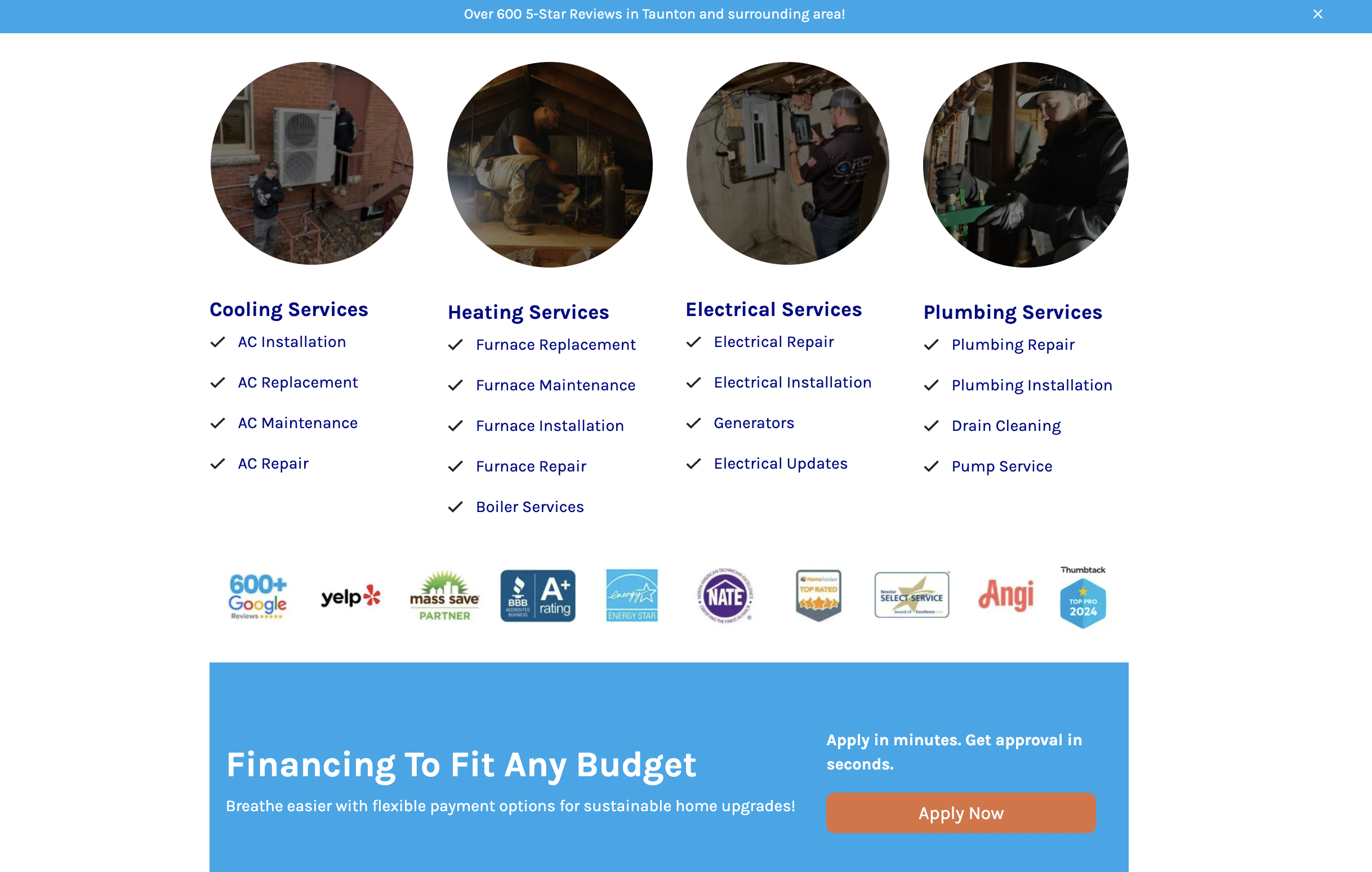
This page provides a deeper dive into your specific HVAC services.
- Detailed Service Descriptions: Explain each service you offer in detail. This could include information on heating and cooling system installation, repairs, maintenance plans, emergency services (if offered), etc. Consider using bullet points to improve readability.
- Pricing Information (Optional): While not all businesses choose to display pricing upfront, including estimated costs or service tiers can be helpful for some customers.
- Visual Appeal: Incorporate high-quality images or videos showcasing your technicians in action or the types of systems you service.
3. About Us Page:
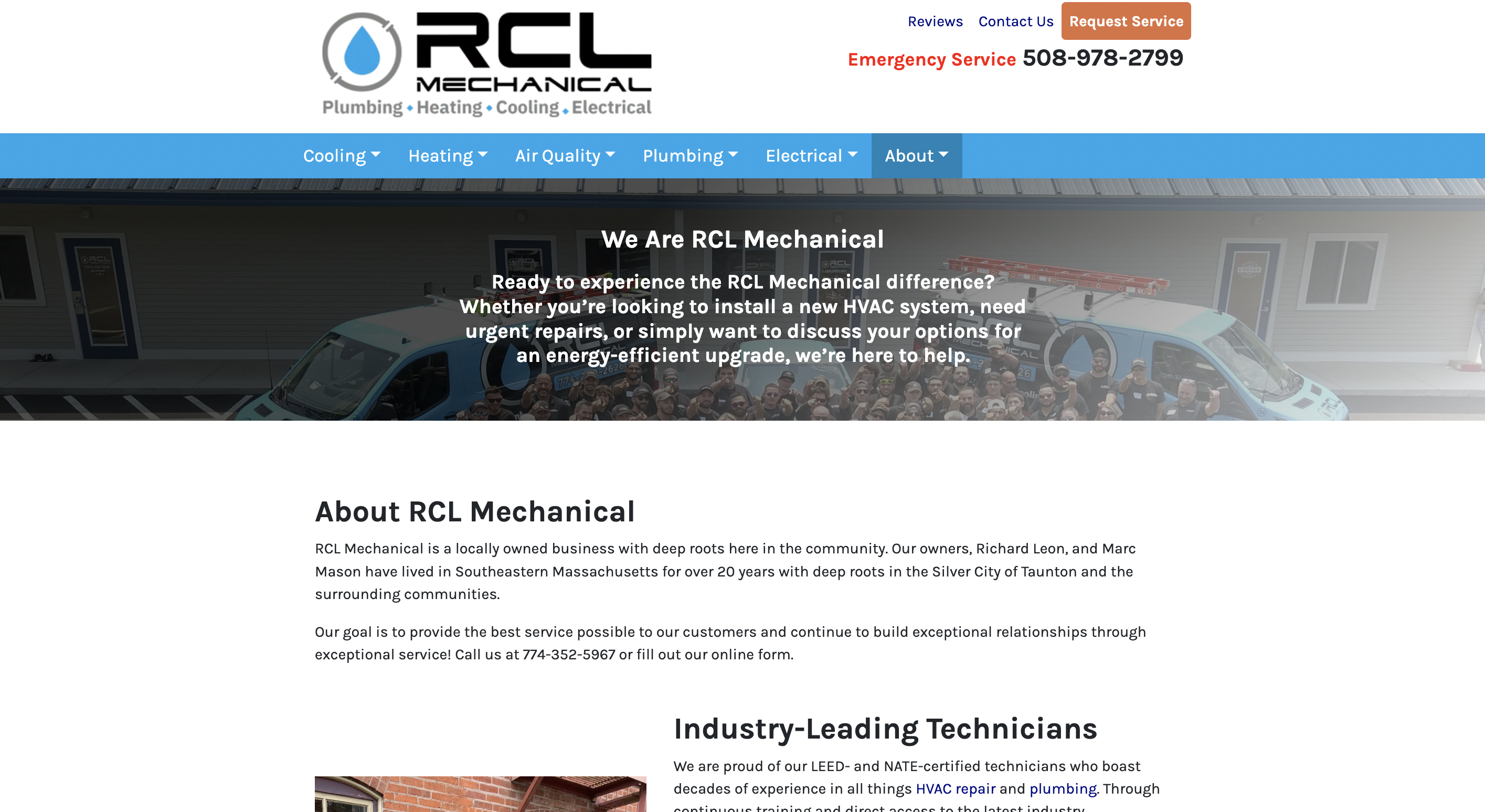
Build trust and transparency by introducing your company and team members.
- Company Story: Share your company’s history, mission statement, and values. Let potential customers understand what your business stands for.
- Meet the Team: Include profiles with photos, qualifications, and experience to showcase your team members’ expertise. This helps build rapport and portrays your company as professional and reliable.
4. Contact Us Page:
Make it easy for potential customers to reach you. This page should include:
- Clear Contact Information: List your phone number, email address, and physical address (if applicable). Consider including a map for easy location reference.
- Contact Form: Provide a user-friendly contact form for visitors to submit inquiries or request service quotes.
5. Testimonials Page:
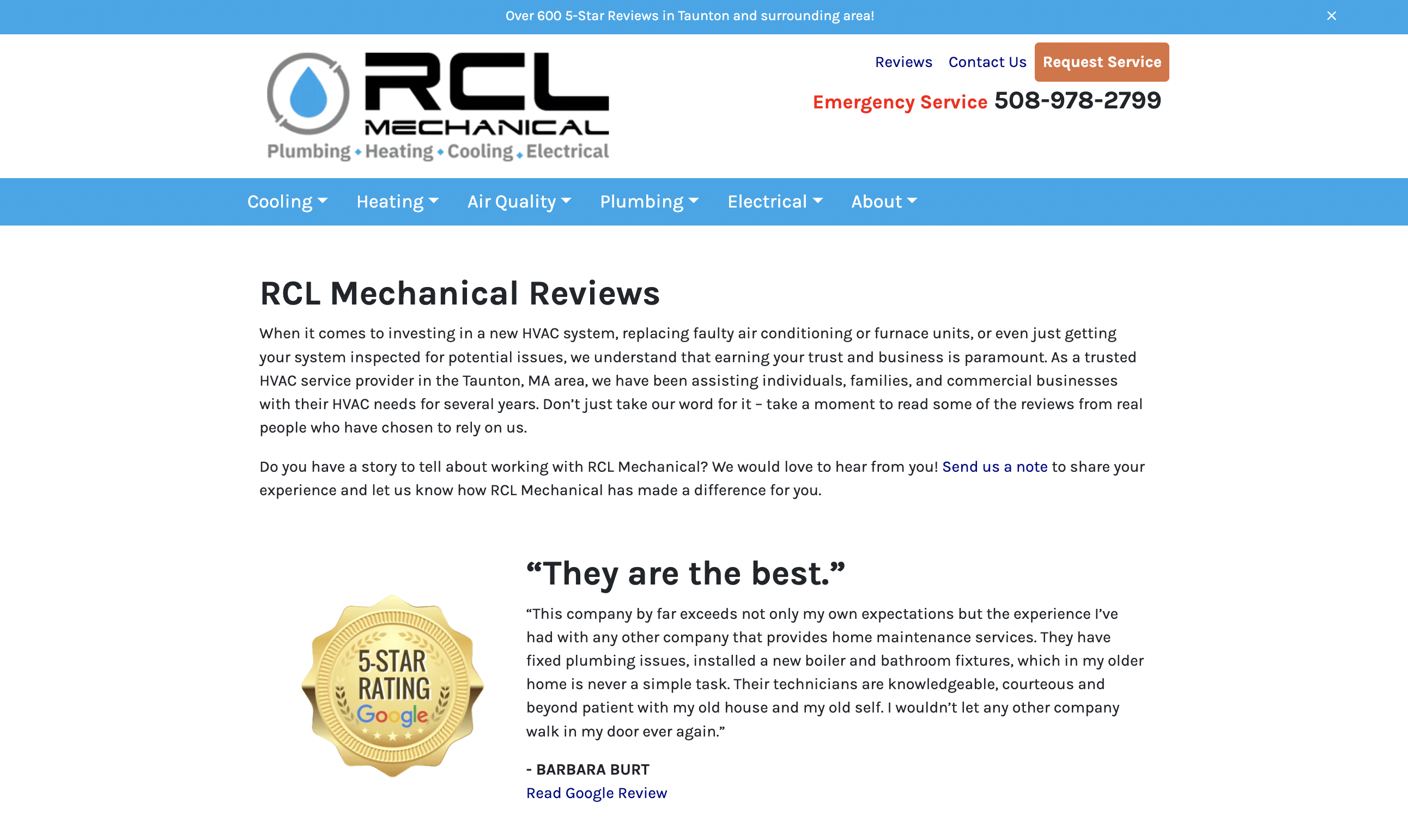
Positive customer reviews and testimonials are powerful trust builders.
- Showcase Testimonials: Feature positive feedback from satisfied customers. If possible, include quotes, star ratings, or video testimonials.
- Social Proof: Consider integrating social media reviews or customer stories to demonstrate your trustworthiness further.
By incorporating these essential pages and keeping your content fresh and informative, your HVAC website will become a valuable tool for attracting new customers and growing your business.
Improve Your HVAC Website Results
3.3 million leads and counting: now for HVAC companies! Our track record speaks for itself. Get ahead with exclusive early access!

Keeping Your Website Thriving: Launch, Maintenance, and Beyond
Your HVAC website is launched, congratulations! But the work doesn’t stop there. Here’s how to ensure your website continues to attract potential customers and drive business growth:

1. The Power of Search Engine Optimization (SEO):
Imagine your website buried deep in search engine results, invisible to potential customers. SEO helps your website rank higher in search engine results pages (SERPs) for relevant keywords like “furnace repair near me” or “AC installation [your city].” This increases website traffic and helps you reach your target audience organically.
- Keyword Research: Identify relevant keywords that potential customers might use to find HVAC services in your area. Tools like Google Keyword Planner can help with research.
- Content Optimization: Integrate these keywords naturally throughout your website content, including page titles, meta descriptions, and service descriptions.
- Local SEO: Optimize your website for local searches by claiming your Google My Business listing and ensuring your NAP (Name, Address, Phone number) is consistent across the web.
2. Content Marketing Strategies:
Regularly updated content keeps your website fresh and engaging for visitors while also improving your SEO. Here are some content marketing strategies to attract potential customers:
- Blog: Establish yourself as an HVAC expert by sharing informative blog posts on seasonal maintenance tips, energy-saving solutions, or common heating and cooling problems.
- Customer Education: Create helpful guides or FAQs to address common customer concerns about HVAC systems.
- Seasonal Promotions: Highlight special offers or discounts on seasonal services like pre-season tune-ups or winterization packages.
3. Website Maintenance:
Your website needs ongoing maintenance to ensure it functions smoothly and stays secure.
- Content Updates: Regularly update your website content with fresh blog posts, news, and promotions. This keeps visitors engaged and demonstrates your commitment to providing valuable information.
- Security Measures: Implement strong security measures, such as SSL certificates, to protect your website and visitor data. Also, regularly update website plugins and software to address security vulnerabilities.
- Analytics Tracking: Use website analytics tools to track website traffic, user behavior, and lead generation. This data can help you understand how visitors interact with your website and identify areas for improvement.
By implementing these strategies, you’ll ensure your HVAC website remains a valuable asset for your business. Remember, your website is a dynamic tool, not a static brochure. Keeping it updated, optimized, and engaging will attract more customers and keep your HVAC business thriving.
Conclusion: Building Your Online Presence, Building Your Business
In today’s digital world, a strong website is no longer a luxury for HVAC businesses – it’s a necessity. Your website acts as your 24/7 salesperson, showcasing your services, building trust with potential customers, and generating valuable leads.
By following the steps outlined in this blog post, you can take control of your online presence and create an HVAC website that effectively attracts new customers and drives business growth.
Ready to take action? Here are your options:
- Explore DIY Website Builders: If you’re comfortable with some basic tech skills and have a budget in mind, DIY website builders offer a user-friendly platform to get started. Before diving in, weigh the pros and cons of limited customization options.
- Partner with a Professional Web Design Company: For a more comprehensive solution with custom design, SEO optimization, and ongoing maintenance, consider partnering with a reputable web design company. Their expertise can help you create a website that perfectly reflects your brand and achieves your marketing goals.
Looking for more resources?
Here are some helpful links to get you started:
- Google My Business: https://www.google.com/business/ (Claim your free listing and optimize your local SEO)
- HVAC Website Builders:
- Carrot: https://go.carrot.com/hvac/
- Squarespace: https://www.squarespace.com/
- Weebly: https://www.weebly.com/websites/how-to-make-a-website
- SEO Tools:
- Google Keyword Planner: https://ads.google.com/home/tools/keyword-planner/
- SEMrush: https://semrush.com/ (All-in-one SEO platform with keyword research, competitor analysis, and website audit features)
- Ahrefs: https://ahrefs.com/ (Comprehensive SEO toolset for keyword research, backlink analysis, and rank tracking)
Remember, a successful website is an ongoing journey. By keeping your content fresh, website secure, and SEO strategy up-to-date, you’ll ensure your HVAC website remains a powerful tool for attracting new customers and growing your business for years.
Improve Your HVAC Website Results
3.3 million leads and counting: now for HVAC companies! Our track record speaks for itself. Get ahead with exclusive early access!
